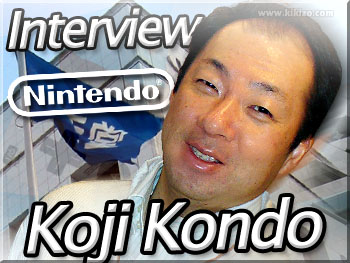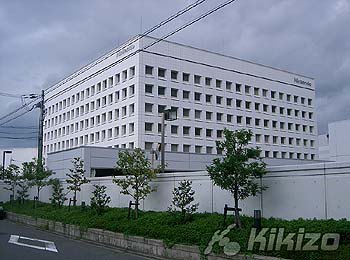Nintendo Interview: Koji Kondo
In this exclusive interview we chat with the Miyamoto of game audio - the industry's most legendary composer.
Page: 1 2
By Kikizo Staff
Since joining Nintendo in 1984, Koji Konno has become one of the most admired creators in the world of videogames. But rather than tweaking level design or fiddling with graphics, Kondo works on the audio side of games, and has created the themes of every big Mario and Zelda since the beginning. His music is arguably as recognisable as Nintendo's characters.

But he couldn't just waltz into the company's Kyoto office and start waving a stick. Making game music back then was a challenging battle with the limitations of 8-Bit game hardware like the Nintendo Entertainment System. The fact that fans never tire of his music (made freshly available once more on the Wii Virtual Console) nor his latest cutting-edge audio in the likes of Twilight Princess, is testament to Kondo's success.
We recently met with this legendary gaming icon for a 1-1 chat (our last confrontation was during Twilight Princess development in 2005 where he was flanked by Miyamoto, Aonuma and Konno) to find out what makes him tick and what we can expect from him next.
![]()
Kikizo: Thanks for your time Mr Kondo. Please tell us a bit about how you came to be interested in music, and videogame music in particular?
Kondo: Well, as far as music in general, I started working on an electric organ, [like a synthesizer] - a Yamaha is what I had at the age of 5, and I continued with that as well as learning piano from that time on. As far as game music goes, I graduated from university, and was employed by Nintendo. I was actually the first employee hired to work on game sound specifically, as a full-time employee.
Kikizo: So this was back in the 70s then, late 70s?
Kondo: Actually, it was in 1984.
Kikizo: So, before that, Nintendo didn't have a fulltime employee for that part?
Kondo: Yeah, generally Nintendo just used people who were hired as electrical engineers, or programming that had some musical background, they would sort of use them to add some musical elements to the game.
Kikizo: What was your first compositional work?
Kondo: The music for the arcade game "Punch-out."
Kikizo: Nice! Well, one thing about the Famicom... the sound hardware was notoriously restrictive, yet you and many other composers were able to use it to create some of the most memorable game music ever. Can you describe some of the challenges you faced when composing for the Famicom and how you worked around them?
Kondo: Well, as you know, the Nintendo Entertainment System had only three sound sources to work with, and it also had a very limited sound bank. Though what we tried to do was just really create different combinations using these limited resources to create images in the player's mind, or to have the player build up to something that would hopefully match with what they're playing, through those limited sound combinations,
Kikizo: The Famicom Disk System had an extra sound channel added to it. How did this affect your composition, and did you have to rearrange music for when these games came to Western territories?
Kondo: Well, I mean, even the addition of that one extra channel was something that made me VERY happy because they were to make the music more expressive - and not only music, we were able to create a lot of different sound effects we weren't able to do before. And it would allow us to then express more of what is in the game through the user via sound. So again, just the addition of that one extra channel was something that was very pleasing for myself and the staff.
Kikizo: Well, once those Famicom Disk games came to the West, they were no longer on disk, so the extra sound channel wasn't there anymore. How did you go to dealing with that, then? You had a nice composition and then had to scale it back for separate territories - did you do these mixes himself?
Kondo: Um, yeah, it was obviously a challenge to make those new arrangements. I worked on all of those myself. What we did, especially for sound effects, was we used the sample sources so that, via delta modulation, they could kind of use a workaround to recreate the sound effects. It was a cheap way of doing this, but that's what we had to work with. [Super Mario Bros 2's sound effects are a good example of this - Kikizo].
Kikizo: In some games, Zelda II in particular, the music in some places was completely different. Did you do that?
Kondo: I didn't work on Zelda II, so... that wasn't me, so that would account for the difference in the music.
Kikizo: What some companies did to get around the sound restrictions was to use a special sound chip with its own driver. Konami did that with Castlevania III - Akumajou Densetsu. Did you ever think of doing something like that to get around restrictions of hardware on the consoles?
Kondo: No, Nintendo didn't include any sort of sound drivers within the cartridges themselves.
Kikizo: A lot of game music composers and fans actually prefer the music from older, more restricted sound hardware of 8- and 16-bit consoles. Because resources were limited, you really had to push the hardware to create memorable music. The melodies are thought to be stronger and more melodic than the more orchestral music of games today. Do you think this is true? Do you enjoy working with the newer sound systems, or do you like the older stuff more?
Kondo: Well, I think that both systems have their strengths and weaknesses. One of the good things about the older 8- and 16- bit was because of the limited resources that you said we had to work with - we had to be very creative, and we couldn't rely on a wide range of music, or a wide range of orchestration to create the melody. We had to create this core melody, and play it with these limited resources. Whereas today, I think that people sometimes think, "well, we've got all of this." So rather than having to create something that's really great, they just, you know, rely heavily on technology, or say, the instrumentation.
Page: 1 2
| Video Coverage (Latest Videos & Video FAQ) | |||
| PLEASE DO NOT DIRECT LINK TO ANY MEDIA FILE ON KIKIZO | |||
| Description | Dur. | Size | Details |
| Wii Music | |||
|
Wii Music Miyamoto demonstration gameplay (Wii - Nintendo) |
01:20 | 40MB | DF, ED, 16:9 852x480p60 4.2Mbps |
|
Wii Music Direct feed trailer (Wii - Nintendo) |
00:22 | 8MB | DF, ED, 16:9 852x480p60 3.3Mbps |
| Video Interviews | |||
|
Nintendo Video Interview Previous video interview with Nintendo staff including Koji Kondo, June 2005 |
28.34m | 181MB | SD, 30 640x480 1Mbps |
|
Nintendo Video Interview Previous interview with with Nintendo's Katsuya Eguchi, June 2006 |
12:58 | 248MB | ED, 16:9 856x480p60 2.7Mbps |
|
David Yarnton Interview Previous video interview with Nintendo UK boss David Yarnton, Sept 2006 |
10:40 | 61MB | CAM, ED, 16:9 856x480/60p 2Mbps |
|
Satoru Iwata Speech NCL president speaks, Sept 2006 |
15:29 | 60MB | SD, 16:9 640x360/30p 1Mbps |
|
Satoru Iwata Video Interview Exclusive video interview with NCL President, May 2004 |
21:50 | 60MB | SD, 16:9 320x240/30p 1Mbps |
| Mario and Zelda | |||
|
Super Mario Galaxy Direct feed gameplay (Wii - Nintendo) |
00:28 | 13MB | CAM, ED, 16:9 852x480p60 4.2Mbps |
|
Super Mario Galaxy Showfloor gameplay 1 (Wii - Nintendo) |
03:18 | 101MB | CAM, ED, 16:9 852x480p60 4.2Mbps |
|
Super Mario Galaxy Showfloor gameplay 2 (Wii - Nintendo) |
04:30 | 137MB | CAM, ED, 16:9 852x480p60 4.2Mbps |
|
The Legend of Zelda: Twilight Princess Direct feed trailer (Wii - Nintendo) |
00:24 | 11MB | DF, ED, 16:9 852x480p60 4.2Mbps |
|
The Legend of Zelda: Twilight Princess Showfloor gameplay 1 (Wii - Nintendo) |
02:54 | 88MB | CAM, ED, 16:9 852x480p60 4.2Mbps |
|
The Legend of Zelda: Twilight Princess Showfloor gameplay 2 (Wii - Nintendo) |
01:51 | 56MB | CAM, ED, 16:9 852x480p60 4.2Mbps |
|
The Legend of Zelda: Twilight Princess Direct feed gameplay (Wii - Nintendo) |
05:36 | 169MB | DF, ED, 16:9 852x480p60 4.2Mbps |
|
The Legend of Zelda: Twilight Princess Direct feed GameCube trailer (Wii, GCN - Nintendo) |
00:52 | 8MB | DF, SD, 4:3 640x480p30 1.3Mbps |









 Satoru Iwata Video Interview - the late Nintendo president spoke with Kikizo in 2004 as 'Nintendo Revolution' loomed.
Satoru Iwata Video Interview - the late Nintendo president spoke with Kikizo in 2004 as 'Nintendo Revolution' loomed. Kaz Hirai Video Interview - the first of Kikizo's interviews with the man who went on to become global head of Sony.
Kaz Hirai Video Interview - the first of Kikizo's interviews with the man who went on to become global head of Sony. Ed Fries Video Interview - one of Xbox's founders discusses an epic journey from Excel to Xbox.
Ed Fries Video Interview - one of Xbox's founders discusses an epic journey from Excel to Xbox. Yu Suzuki, the Kikizo Interview - we spend time with one of gaming's most revered creators.
Yu Suzuki, the Kikizo Interview - we spend time with one of gaming's most revered creators. Tetris - The Making of an Icon: Alexey Pajitnov and Henk Rogers reveal the fascinating story behind Tetris
Tetris - The Making of an Icon: Alexey Pajitnov and Henk Rogers reveal the fascinating story behind Tetris Rare founders, Chris and Tim Stamper - their only interview? Genuinely 'rare' sit down with founders of the legendary studio.
Rare founders, Chris and Tim Stamper - their only interview? Genuinely 'rare' sit down with founders of the legendary studio. The History of First-Person Shooters - a retrospective, from Maze War to Modern Warfare
The History of First-Person Shooters - a retrospective, from Maze War to Modern Warfare